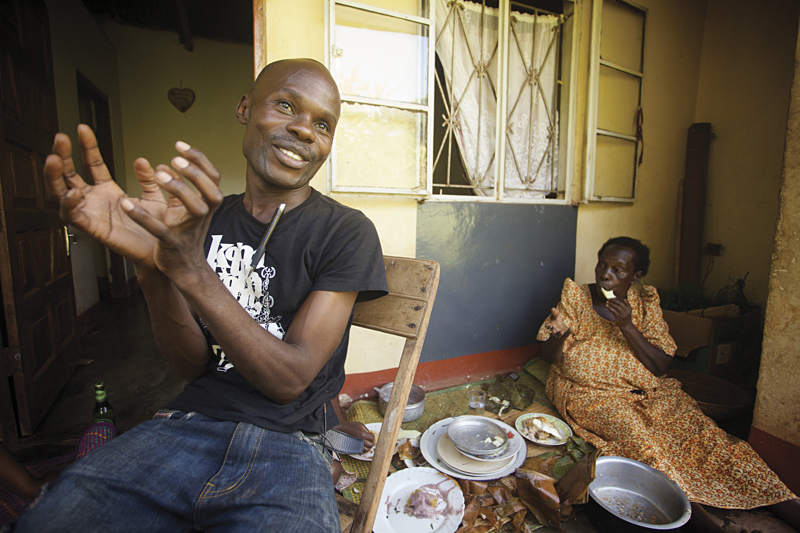Everybody loves Glee, which makes it almost impossible to dislike Chris Colfer, the young talent who wrote and stars in the high-school comedy Struck by Lightning. That film opens the 17th Seattle Lesbian & Gay Film Festival (7:30 p.m. Thurs., Oct. 11, Cinerama), and it plays like a cheerful gay Revenge of the Nerds. Being out isn’t the problem for precocious Carson (Colfer); his greater challenge is blackmailing fellow students into contributing to his campus literary journal—another trophy on his college app, so he can escape his hick town and fraught family (alkie mother Allison Janney, runaway dad Dermot Mulroney, prospective stepmom Christina Hendricks). However, never having seen Glee, I’ll make two observations about Colfer: 1) Yes, he’s very likable, but 2) as a writer, he’s no John Hughes. Struck by Lightning means well, but its gentle dissection of high-school cliques brings nothing new to the genre. The greater value to your $33 gala ticket is the after-party at The Social, where you can compare whose high-school days were worse.
Far from high school, far from the U.S., Uganda provides a fascinating window into the bad old days of gay rights, a kind of pre-Stonewall parallel universe where government, media, and church still conspire to oppress. “Kuchu” is slang for homo in Call Me Kuchu (7 p.m. Sun., Oct. 14, Egyptian), whose heroes are the small—and we mean small—band of activists being attacked by a rabid tabloid called Rolling Stone. (No relation to our Rolling Stone, whose founder Jann Wenner is, of course, gay; we hope he sues for trademark infringement.) The paper specializes in photographic sting operations designed to shame and humiliate, as its smiling editor readily explains to directors Katherine Fairfax Wright and Malika Zouhali-Worrall. His candor is fairly shocking; it’s like Roger Ailes telling us what he really thinks. Unfortunately, the filmmakers had less success in interviewing the white American evangelicals who are stirring up hate in Uganda. At the center of their film is David Kato, who sues the paper and leads a lobbying effort against a discriminatory bill in Parliament (one that draws condemnation from Obama and other Western leaders). He’s a soft-spoken kind of hero, pitted against a plainly evil journalist.
If you didn’t follow this recent news story, Call Me Kuchu can seem a little dry and procedural as it wades through legal hearings and press conferences. After an hour, though admiring Kato and company, I felt I knew them well enough. But there’s more: The movie’s final 30 minutes are like a kick in the stomach. A strong drink is recommended after the screening.
The three young subjects of Gay Latino Los Angeles (9:30 p.m. Wed., Oct. 17, Northwest Film Forum) don’t face anywhere near the same level of discrimination. Rather, their barriers seem to be more cultural—the smothering traditions of family and Catholicism, the lack of economic opportunity. Around them, in anything-goes Los Angeles, it’s easy to be out. In the barrio, self-expression is a more delicate matter, made in baby steps. Freest is Mexican immigrant Alex, a bootstrapping kind of guy who marvels of the city, “Nobody has time to stop and judge you”—unlike his village back home. Any young person fresh out of college, gay or straight, will identify with new graduate Brian, who can’t find a job and fritters away his time on Facebook instead of dating actual guys. Then there’s the shaven-headed, heavily tattooed Carlos, looking like a gang-banger but living at home, where he carefully takes a lint roller to his baggy jeans. Director Jonathan Menendez treats all three sympathetically, and doesn’t pretend that easy days lie ahead.
Family weighs more heavily still in Tomer Heymann’s The Queen Has No Crown (noon, Sun., Oct. 14, Egyptian). No, it’s not a drag comedy (the title refers to a pop song), but an intimate autobiographical project culled from 20 years of home movies by an Israeli family with five sons. Tomer is the gay son, with a caustic fraternal twin who takes a dim view of his constant filming. “Life is not a documentary,” he scoffs, but Tomer isn’t deterred. He takes his video camera everywhere during his time as a soldier (gazing at sleeping buff bodies) and beyond. He visits three brothers who resettle in the U.S., much to the chagrin of the divorced Mrs. Heymann, left back in Israel with no grandchildren. “Parents love their kids more than kids love their parents,” she tells Tomer, who begins bringing his boyfriends to Passover. He’s entirely out to his family, who seem loving and accepting, but then there’s the guilt—the colossal Jewish guilt. If Tomer can’t marry, can he gay-marry? And what about kids? The filmmaker interviews everyone but himself. Crucial questions are left unanswered, children grow up, parents grow old, and there’s the sad acknowledgement that no family ever remains as it was. The snapshots fade, and the home movies never run in reverse.








